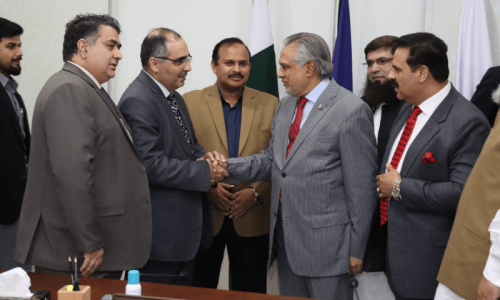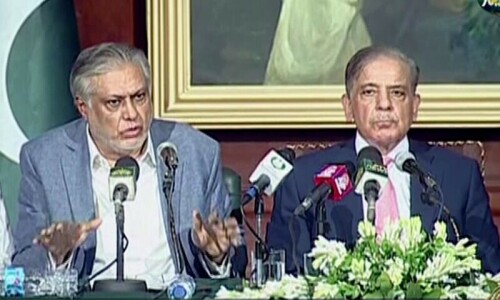KARACHI: Welcoming the signing of the $3 billion nine-month Stand-By Arrangement (SBA) with the IMF, the business community hopes the deal would end uncertainty and restore the confidence of local and foreign investors direly needed to revive the economy.
Talking to Dawn, Businessmen Group (BMG) Chairman Zubair Motiwalla said this Staff-Level Agreement (SLA) would bring economic stability besides restoring foreign investors’ confidence, stability in the rupee-dollar parity and positive impact on the stock market.
He, however, feared that the IMF bailout programme may increase the cost of production which really scares the entire business community and the government should give special attention to addressing this concern.
“I hope that the US dollar will slide down to its original value, thus helping in controlling food inflation while the interest rate will also be brought down,” observed Mr Motiwalla.
Higher energy tariffs, policy rate remain key concerns for industry
After the SLA, he said the money coming from friendly countries and multilateral donor countries would provide fiscal space to the government.
This fiscal space, he added, should be utilised to see that our trade account expands in a way that the country’s exports and balance of payments are taken care of.
“We should concentrate on bringing more home remittances and increasing the exports and making exports viable by bringing the cost of manufacturing and the cost of doing business on par with our regional competitors,” he said.
For boosting industrial activities, Mr Motiwalla stressed efforts should be made to ensure speedy refunds of sales tax and Duty Drawback of Local Taxes and Levies.
Pakistan Business Council Chief Executive Ehsan Malik said the SLA for standby facility to bridge liquidity gaps is welcome and its phased release should keep the government on a responsible path within the tramlines stipulated by the IMF.
Surprising, however, is IMF’s belief that the tax base has been widened by the budget. It has not. It has been deepened with existing taxpayers, including the salaried employees taxed at higher rates and the untaxed and undertaxed retail, wholesale and real estate left mostly untouched, he said.
The industry will also have to carry the brunt of higher energy tariffs as if higher rates were a sustainable solution to distribution losses, theft and under recovery which are the real reasons for circular debt. There is nothing substantial demanded by the IMF on stemming leakages due to state-owned enterprise losses. Another surprising expectation is that imports can be eased. How is that possible with $3.5bn of foreign exchanges? he questioned.
Mr Malik said for sure industry in the formal sector will carry the brunt of the higher policy rate, even if knowing that policy rate is not the right solution to curbing cost-push inflation.
He said the industry will continue to be squeezed from all sides. “We are slowly killing the goose that lays the golden egg,” he added.
On a positive note, Mr Ehsan said the standby credit pushes the risk of default further down the line. A $3bn facility will not take care of over $20bn required to service external debt in the next 12 months.
Federation of Pakistan Chambers of Commerce and Industry (FPCCI) President Irfan Iqbal Shaikh the IMF agreement will analyse the right direction of the economy.
For the last 1.4 years, uncertainty had ruled the country and economy resulting in the flight of capital from Pakistan, shaking the confidence of businessmen and negative impact on trade and industries.
He said despite some harsh conditions imposed by the IMF, this is the shortest and best way to strike a deal with the leading lender to pull out the country’s economy from a serious collapse.
“I do not like the IMF as Pakistan has taken 22 programmes but achieved a growth of up to 4.2pc,” he said, hoping that after getting a fresh IMF loan, other donors and various countries are likely to give $10-12bn in future which will restore businessmen confidence.
Mr Irfan said the country needs various steps like austerity measures, an incentive package for overseas Pakistanis to secure their investment to bring in more foreign direct investment, encourage industrialisation for job creation, control imports, boost exports and long-term planning for the country.
FPCCI is making a 15-year economic development plan and taking all the political parties on board to develop a consensus.
Published in Dawn, July 2nd, 2023














































Dear visitor, the comments section is undergoing an overhaul and will return soon.